

How To Motivate Students Without Losing Control Of Your Class. If you’ve been teaching for longer than say… three minutes, then you’ve no doubt been hammered over the head with the idea that enthusiasm is important to effective teaching.
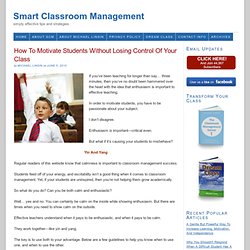
In order to motivate students, you have to be passionate about your subject. I don’t disagree. Enthusiasm is important—critical even. But what if it’s causing your students to misbehave? Yin And Yang Regular readers of this website know that calmness is important to classroom management success. Students feed off of your energy, and excitability isn’t a good thing when it comes to classroom management. How To Improve Attentiveness In 5 Minutes. You notice it an hour or so into the school day.
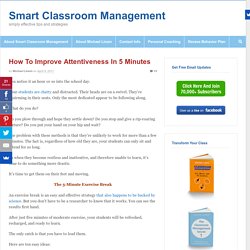
Your students are chatty and distracted. Their heads are on a swivel. They’re squirming in their seats. Only the most dedicated appear to be following along. What do you do? Do you plow through and hope they settle down? The problem with these methods is that they’re unlikely to work for more than a few minutes. So when they become restless and inattentive, and therefore unable to learn, it’s time to do something more drastic. It’s time to get them on their feet and moving. The 5-Minute Exercise Break An exercise break is an easy and effective strategy that also happens to be backed by science.
How To Stem The Tide Of Student Questions. Questions are the lifeblood of learning; they mustn’t be discouraged.
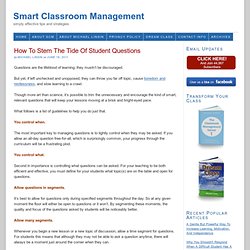
But yet, if left unchecked and unopposed, they can throw you far off topic, cause boredom and restlessness, and slow learning to a crawl. Though more art than science, it’s possible to trim the unnecessary and encourage the kind of smart, relevant questions that will keep your lessons moving at a brisk and bright-eyed pace. What follows is a list of guidelines to help you do just that. You control when. The most important key to managing questions is to tightly control when they may be asked. You control what. Second in importance is controlling what questions can be asked. Allow questions in segments. It’s best to allow for questions only during specified segments throughout the day. Allow many segments. Whenever you begin a new lesson or a new topic of discussion, allow a time segment for questions. Define the segment. Open the floor for questions by defining the topic. Don’t take questions during instruction. Are You Boring Your Students Into Misbehavior?
Your students love video games.
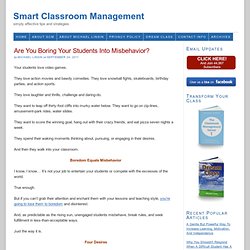
They love action movies and bawdy comedies. They love snowball fights, skateboards, birthday parties, and action sports. They love laughter and thrills, challenge and daring-do. They want to leap off thirty-foot cliffs into murky water below. They want to go on zip-lines, amusement-park rides, water slides. They want to score the winning goal, hang out with their crazy friends, and eat pizza seven nights a week. They spend their waking moments thinking about, pursuing, or engaging in their desires. An Amazing, Eye-Opening Following Directions Strategy. Are your students slow to follow directions?
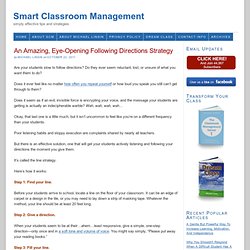
Do they ever seem reluctant, lost, or unsure of what you want them to do? Does it ever feel like no matter how often you repeat yourself or how loud you speak you still can’t get through to them? Does it seem as if an evil, invisible force is encrypting your voice, and the message your students are getting is actually an indecipherable warble?
How To Give Your Students Unforgettable Directions. 8 Things Teachers Do To Cause Boredom. When students get bored their minds drift.
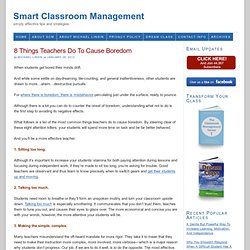
And while some settle on daydreaming, tile-counting, and general inattentiveness, other students are drawn to more…ahem…destructive pursuits. For where there is boredom, there is misbehavior percolating just under the surface, ready to pounce. Although there is a lot you can do to counter the onset of boredom, understanding what not to do is the first step to avoiding its negative effects. What follows is a list of the most common things teachers do to cause boredom. By steering clear of these eight attention killers, your students will spend more time on task and be far better behaved.
A Tutorial On Attentiveness; Plus Thoughts On The Power Of Review. As the school year winds to a close, here at Smart Classroom Management we’ve been getting a burst of emails from teachers voicing their frustrations with their students’ inability or unwillingness to pay attention.
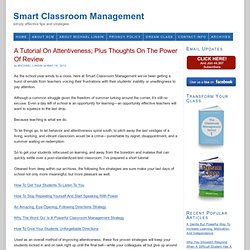
Although a common struggle given the freedom of summer lurking around the corner, it’s still no excuse. Even a day left of school is an opportunity for learning—an opportunity effective teachers will want to squeeze to the last drop. Because teaching is what we do. To let things go, to let behavior and attentiveness spiral south, to pitch away the last vestiges of a living, working, and vibrant classroom would be a crime—punishable by regret, disappointment, and a summer waiting on redemption. So to get your students refocused on learning, and away from the boredom and malaise that can quickly settle over a post-standardized-test classroom, I’ve prepared a short tutorial.